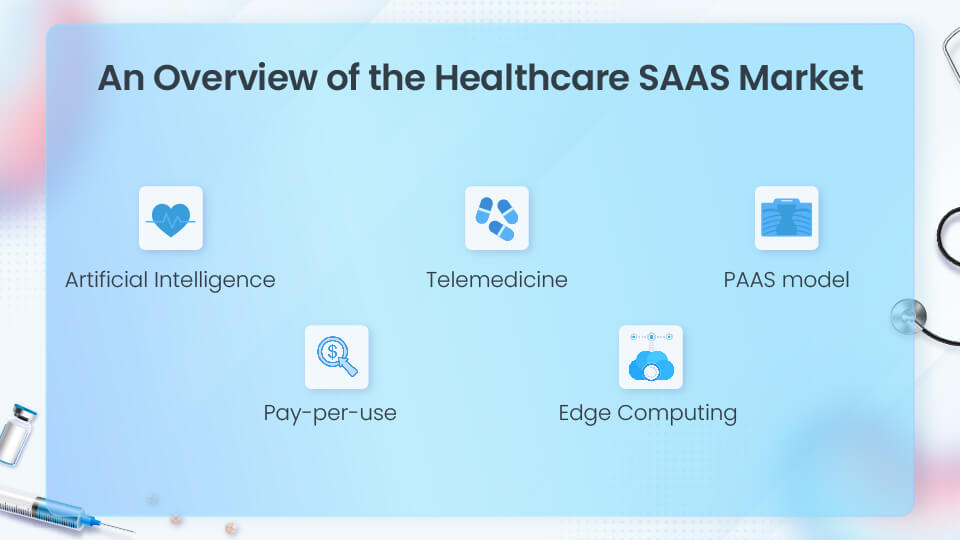A Step-by-Step Guide on Healthcare SAAS Startups for Entrepreneurs
Table Of Content
Published Date :
01 Feb 2024
The healthcare industry is a field where tech and SAAS solutions haven’t progressed a lot, despite a massive evolution of the technology. One major reason behind this is – reluctance to adopt technology.
Though we have innovative healthcare software solutions like telehealth & telemedicine platforms, people still feel confident in visiting clinics, consulting doctors face-to-face, and seeking opinions. But, the pandemic has been a game changer for the adoption of healthcare SAAS. Amid the COVID-19 outbreak, when patients had to stay within their homes and take health advice virtually, hundreds of startups and healthcare organizations considered investing in automated and interoperable healthcare solutions, like mHealth platforms.
Further, in order to make healthcare more accessible to all and improve outcomes, startups are realizing the need to develop ground-breaking technologies. But, this is not a walk in the park to startups or healthcare institutions.
If you are a budding entrepreneur thinking about leading a healthcare SAAS startup, this blog is for you. Here, we will explore why building a healthcare SAAS is the best thing a healthcare startup can do. We will also get you through the complexities involved in running a healthcare tech startup successfully.
Without further ado, let’s head to the discussion!
An Overview of the Healthcare SAAS Market
Below are the top healthcare SAAS trends that will be ruling in 2024 and beyond-

Artificial Intelligence
It’s no wonder that AI is leading the healthcare SAAS trends list and has the potential to revolutionize the industry in unimaginable ways. AI and NLP (natural language processing) are prevalent in healthcare cloud solutions and will likely become more prevalent in the coming years.
Telemedicine
The global telemedicine market is projected to reach $171.8 billion by 2026. Due to its ability to provide easily accessible and more convenient care, telemedicine has seen significant growth in recent years. EHR software combined with telemedicine is a great application of SAAS in healthcare.
PAAS Model
One of the main focus areas for healthcare providers is to retain customers. The PAAS or platform-as-a-service model provides the ability to create custom healthcare applications; thus, increasing the demand for PAAS.
Pay-per-use
People choose to use a healthcare app as it keeps them away from the high costs of physical visits. This means, healthcare tech startups should make sure that their services are cost-effective. However, it doesn’t mean that you need to lose yourself to help your customers. This is where the pay-per-use model helps budding entrepreneurs build a thriving business with minimum investment.
Edge Computing
Edge computing helps in data storage, processing, and data analysis, making data easily available on hands for use. This allows you to cut server costs and streamline data transmission and SAAS workflow.
Now that we have discussed the top trends surrounding the healthcare tech industry, let’s discuss why entrepreneurs should consider investing in SAAS.
Why SAAS For Healthcare Tech Startups?
Healthcare tech startups should consider the SAAS business model for several reasons-

Cut the Budget
Firstly, the SaaS model offers a cost-effective and scalable solution for startups to provide software services without the need for hefty upfront investments in infrastructure. This is particularly beneficial for beginners with limited capital resources. On the customer side, there is no need to purchase hardware and they just need to pay a SAAS subscription for the amount of service they need over a specific period of time.
Offers Seamless Integration and Scalability
The SAAS model supports seamless integration into existing healthcare systems. Healthcare tech startups can offer interoperable solutions that work with diverse platforms, which helps overcome one of the significant hurdles in the industry – the lack of standardization and interoperability.
Caters to the Evolving Needs of Healthcare Industry
The subscription-based SaaS aligns well with the evolving needs of the healthcare industry. Healthcare providers can access and utilize cutting-edge technologies without committing to long-term investments, which offers flexibility and adaptability. This model allows startups to analyze and improve their offerings based on real-time feedback, ensuring that solutions stay relevant and effective in a dynamic healthcare landscape.
Furthermore, the SAAS-based healthcare solution allows healthcare tech startups to stay agile and responsive to market demands. Regular updates, upgrades, and feature enhancements can be seamlessly delivered to users without disruptions. This ensures that healthcare organizations benefit from the latest advancements in technology without experiencing downtime.
How to Develop a Healthcare SAAS Software?
Here are the steps to building a healthcare SAAS software-

Do Competitive Research
Before developing a healthcare SAAS software, it is crucial to conduct intensive market research. It includes identifying the latest trends, key requirements, and competitors. Do market research, competitor research, and customer research. If you don’t conduct thorough research to validate the market demand for your product, you might end up wasting money developing useless software.
Try answering these questions -
- Is there a market demand for a new product?
- What are the pain points of your customers? What are the existing solutions to address their pain?
- How will your SAAS platform alleviate customers’ pain points? What sets your product apart from the rest?
- Does your software have a strong USP?
Outline Software Specifications
The next step is to outline software specifications in a document to let developers know what, how, and why they have to build software. The document should also outline the features of the SAAS platform and how it will be solving customers’ pain points figured out during the research.
Design a Sustainable & User-Friendly Interface
Building custom healthcare software is tricky. Healthcare applications are designed to serve patients and offer valuable information; thus, they must offer a seamless user experience without compromising data privacy. Further, the app must align with the latest healthcare trends and adhere to security standards.
Here are a few must-haves for a healthcare SAAS platform -
- Simple registration process
- Easy navigation to access information
- Intuitive interface with an efficient support system
- Operational support services
- Consumer service portal
- Cross-platform framework for cloud operations
Develop the MVP
Just like any other software idea, designing an MVP for your healthcare software helps you get your idea validated. Developing a minimum viable product also helps you receive feedback to develop your product in the right direction. Also, an MVP lets you know what your audience thinks of your product. This way, you can make changes to the newer version in order to accommodate their needs best.
Keep an Eye on the HIPAA Compliance Checklist
While using an online platform to exchange patients’ information, HIPAA compliance is critical. Here are a few points to keep in mind to ensure HIPAA compliance-
- Generally, healthcare organizations use SAAS applications that store patient health information. Go through each of the applications to ensure that it is HIPAA compliant and prioritizes data security.
- Before transferring your system to the SAAS application, make sure to read all the contracts thoroughly to ensure compliance.
- Set compliance standards (like DICOM, GDPR, etc.) for the healthcare SAAS app to ensure security, and privacy, and improve efficiency.
- Conduct audits to monitor the access attempts to ePHI, implement security measures, identify security breaches, etc.
Test the Product
Testing or beta testing is an important part of developing a healthcare SAAS product. Not only does it allow you to gather user feedback, but it also helps you find out where you need to improve. You can use emails to find the best users, connect with social media influencers, or write articles/blog posts to boost your product’s visibility.
What Challenges Do Healthcare SAAS Companies Face?
One of the most important concerns of healthcare software development companies is data security. When it comes to uploading private healthcare information onto an application, hundreds of questions strike customers’ minds. Thus, one key responsibility of a healthcare SAAS startup is to ensure end-to-end data protection.
Another challenge faced by the healthcare SAAS application development company is trust between the company and the cloud provider. There should be transparency between both parties in order to develop a successful healthcare product.
Bottom Line
This blog was a short guide to building a healthcare SAAS product for budding entrepreneurs. Undeniably, the idea of launching a healthcare tech startup is time-consuming. In fact, it is no less than a roller coaster ride especially if you don’t have an expert by your side. Thus, the first step to take as a novice in healthcare SAAS startup is to get in touch with expert healthcare software developers. Ditstek Innovations, with rich experience in the healthcare domain, is your trusted tech ally who can help you figure out what may suit your business best and how to achieve this. Whether your startup is in the seed stage, you need to validate your idea, or you need a dedicated team of software developers to roll out a healthcare SAAS product, we are here to help you out.
Get in touch with us for more information.

Nidhi Thakur
With more than 19 years of experience - I represent a team of professionals that specializes in the healthcare and business and workflow automation domains. The team consists of experienced full-stack developers supported by senior system analysts who have developed multiple bespoke applications for Healthcare, Business Automation, Retail, IOT, Ed-tech domains for startups and Enterprise Level clients.
Recent Posts

Explore predictive maintenance software features that reduce downtime, cut costs, and boost efficiency with enterprise-grade, AI-powered maintenance systems.

Benefits of AI in real estate include better cash flow planning, improved marketing ROI, stronger pipeline visibility, and scalable growth.

We at DITS offer custom Population Health Management Software Solutions to help you measure the effectiveness and efficiency of care delivery to patients. Read our blog to know in detail.